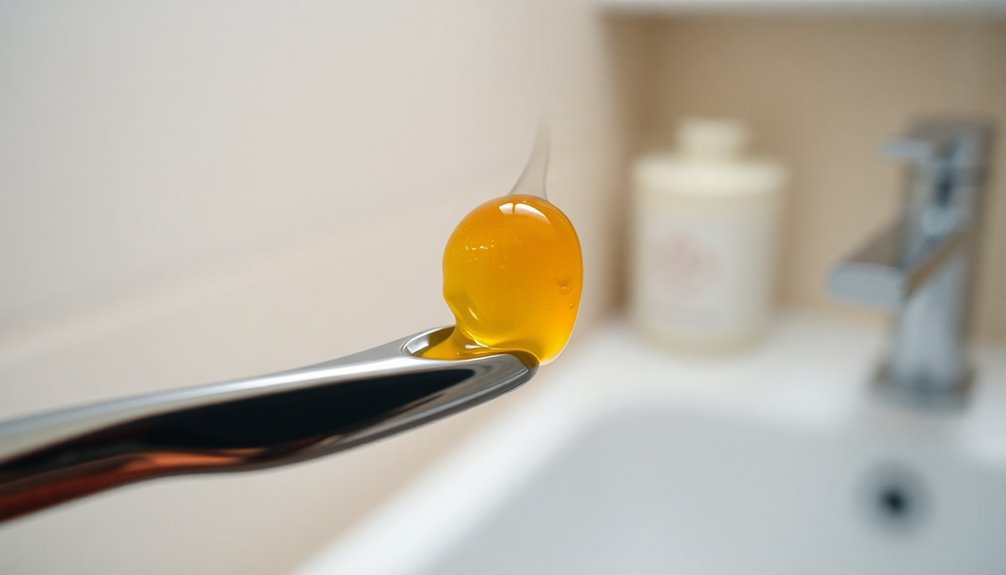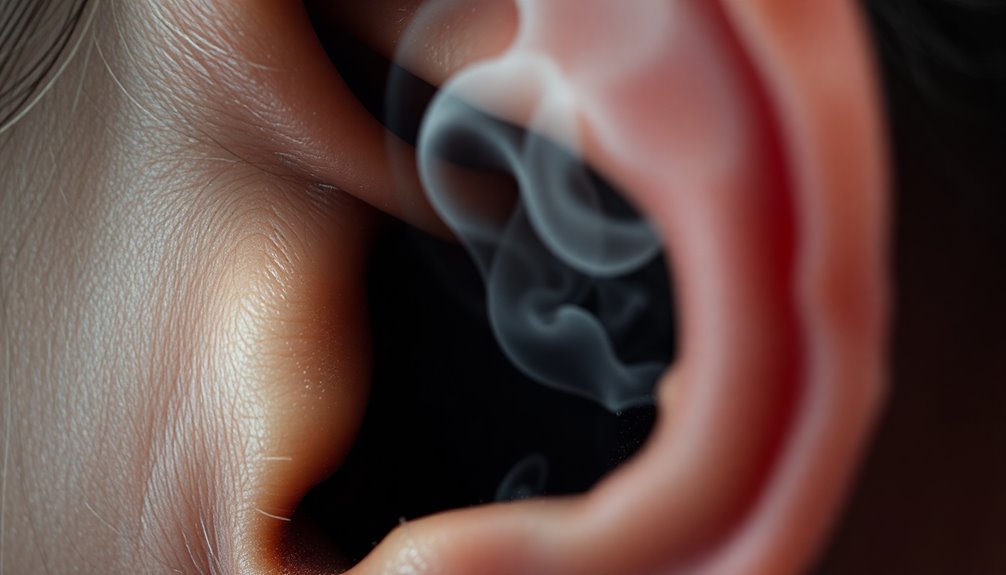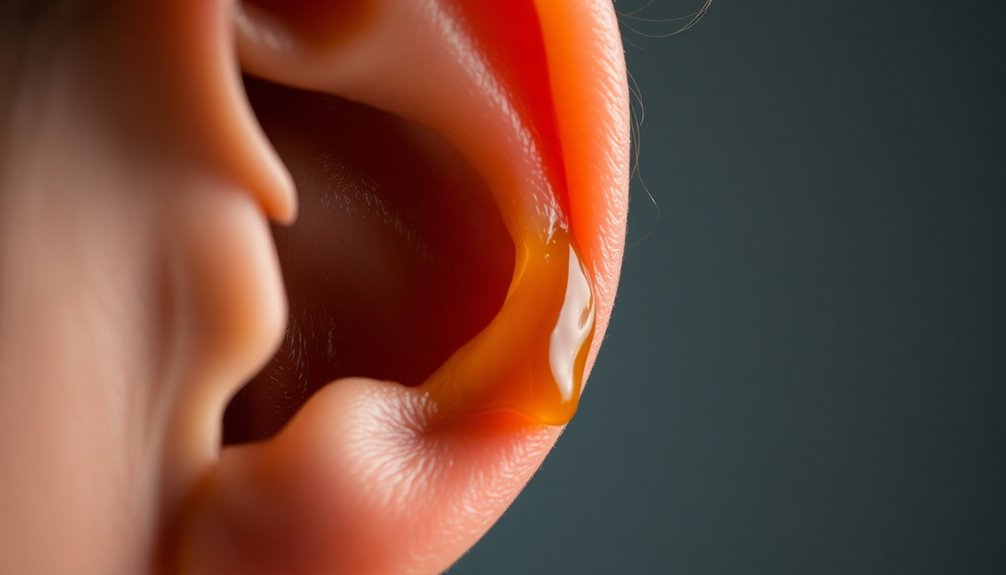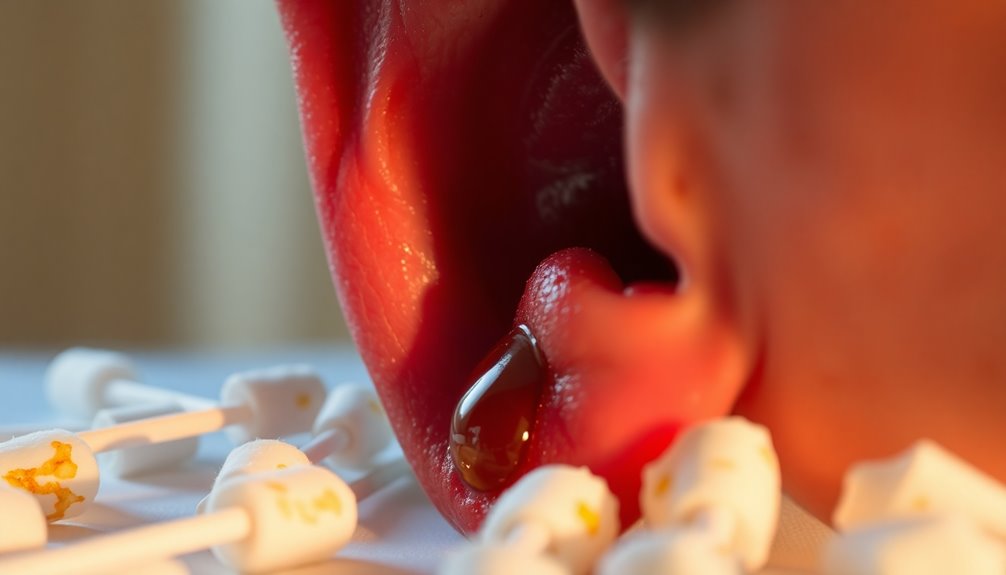If your earwax smells, it's more than just annoying—it could indicate a health issue. Foul odors often stem from infections, poor hygiene, or skin conditions. Bacteria thrive in earwax buildup, causing unpleasant smells. Symptoms like cloudy or pus-filled wax suggest you need to pay attention. Dark or red wax may signal injury or blockage. Don't ignore persistent foul odors; they could mean something's wrong that needs prompt attention. Understanding what's happening in your ears is crucial for your health. You'll find out more about earwax and its implications as you uncover more details.
Key Takeaways
- Smelly earwax often indicates infections, such as otitis externa or media, which require medical attention.
- Poor hygiene can lead to earwax buildup, trapping bacteria and causing foul odors.
- Moisture in the ear canal can worsen odors by breaking down skin and promoting bacterial growth.
- Dark, pus-filled or green earwax may signal serious infections, necessitating prompt consultation with a healthcare provider.
- Persistent symptoms, like ear pain or hearing loss, should not be ignored, as they may indicate underlying health issues.
Understanding Normal Earwax

Earwax, or cerumen, plays a vital role in ear health. It's a complex mixture of secretions from sebaceous and modified apocrine sweat glands. You might be surprised to learn that about 60% of earwax is made up of shed skin cells, known as keratin. Additionally, it contains 12–20% fatty acids, alcohols, and 6–9% cholesterol, along with dead skin cells and hair.
There are two types of earwax: wet and dry, determined by genetics. The wet type, which is dominant, appears light or dark brown and is sticky, while the dry type is recessive, gray or tan, and more brittle. If you belong to certain ethnic groups, like East Asians or Native Americans, you might have the dry type, while Africans and Europeans typically have the wet type.
Earwax serves multiple functions. It protects your ear canal by trapping dirt and microorganisms, maintains skin health, and has antimicrobial properties to inhibit bacteria and fungi growth. This natural substance also acts as a barrier to foreign bodies and helps keep your ears clean through a self-cleaning mechanism. Understanding these aspects of normal earwax can help you appreciate its importance.
Causes of Smelly Earwax

Smelly earwax can be a real concern, and it often indicates an underlying issue. One major cause is infections, such as bacterial or fungal infections in the ear. Conditions like otitis externa, often referred to as swimmer's ear, can arise when water lingers in your ear, leading to foul-smelling earwax. Similarly, otitis media, a middle ear infection, can create drainage that gives off a bad odor.
Poor hygiene also plays a significant role. If you neglect regular ear cleaning, earwax can build up, trapping bacteria and dirt, which leads to unpleasant smells. Blocked ears can result in symptoms like earaches and even mild hearing loss. Maintaining proper hygiene is essential to prevent these issues from arising.
Additionally, foreign objects can contribute to smelly earwax. If something gets lodged in your ear canal, it can cause irritation, increased wax production, and potential infections.
Finally, skin conditions such as eczema or psoriasis can affect the ear's skin, leading to odor. Rarely, serious issues like cholesteatoma or even ear cancer can cause bad smells in earwax, accompanied by other alarming symptoms. It's essential to address these causes to maintain ear health.
Factors That Influence Odor

Several factors can influence the odor of earwax, making it essential to understand their impact on ear health. Infections, such as otitis externa, lead to unpleasant smells due to bacterial or fungal activity. When earwax builds up, it creates a breeding ground for these microbes, exacerbating the odor. Moisture in the ear canal can worsen this by breaking down skin, promoting infections. Additionally, microbial metabolism of earwax components can contribute to the overall odor profile.
Anatomically, your ear's natural cleaning process can be disrupted, resulting in excess earwax and odor-causing bacteria. Damage or blockages in the ear canal can also contribute to bad smells. Chronic conditions like ear eczema can further complicate the situation.
Medical conditions play a role too; infections like otitis media or rarer issues like ear cancer can alter the smell of earwax. Lifestyle factors, such as prolonged water exposure, poor hygiene practices, and exposure to environmental irritants, can increase moisture and bacteria, intensifying odors.
Symptoms to Watch For

Awareness of the symptoms associated with earwax issues is crucial for maintaining ear health. If you notice green or green-tinted earwax, especially if it has pus or a foul smell, it might indicate an infection. Other signs of infection include runny or cloudy earwax, a strong odor or discharge, and ear pain. Severe infections can even lead to middle ear damage. It's important to remember that excessive production or poor clearance of earwax can contribute significantly to these symptoms.
You should also be alert for symptoms of earwax blockage, such as a feeling of fullness in your ear, hearing loss, or ringing noises (tinnitus). Dizziness and itchiness can also signal a blockage. If you see dark brown or red-tinged earwax, or experience earaches and a sensation of fullness, it could indicate an ear injury. In some cases, you might even develop a cough.
General warning signs include black earwax, which may suggest impaction or foreign objects, and smelly earwax pointing to bacterial presence. If your earwax doesn't clear on its own despite these symptoms, it's essential to consult a healthcare provider for proper diagnosis and treatment. Staying vigilant about these symptoms can help you address earwax-related issues promptly.
Safe Removal Techniques

When it comes to removing earwax safely, you've got a few effective techniques at your disposal. First, consider softening the wax. You can use over-the-counter ear drops specifically designed for wax removal or apply natural remedies like warmed olive oil or diluted hydrogen peroxide. Just make sure to test the temperature to avoid burns. Regular softening can help prevent excessive build-up of ear wax.
If you're comfortable, irrigation techniques can help. Use a bulb syringe or an ear irrigation kit to gently flush warm water into your ear. Ensure the water is close to body temperature to prevent dizziness, and avoid using cold water or excessive pressure.
Specialized tools and kits are also an option, but use caution. Avoid sharp devices that can scratch or puncture your ear canal. Instead, try a warm cloth or saline solution to help dislodge the wax.
If you're unsure or if the blockage persists, don't hesitate to seek professional help. An ENT doctor can use specialized tools for a thorough and safe removal. Remember, it's best to avoid using Q-tips or fingers, as they can push wax deeper into the canal and cause complications.
Frequently Asked Questions
Can Diet Affect the Smell of Earwax?
Yes, your diet can affect the smell of your earwax. Consuming certain foods, like dairy, gluten, and processed items, might increase earwax production and alter its odor. If you're eating a lot of spicy foods or sugar, you could also notice a change. On the other hand, incorporating fruits, vegetables, and omega-3 fatty acids can promote a healthier ear environment, potentially leading to less odor and better overall ear health.
Is It Normal for Earwax to Change Color?
Yes, it's normal for earwax to change color. Fresh earwax usually appears off-white or yellow, but as it ages, it can darken to orange or brown. Factors like genetics, environment, and diet also play a role in this color variation. However, if you notice unusual colors like yellow-green or gray, it might indicate a health issue, so it's wise to consult a healthcare professional if you're concerned.
How Often Should I Clean My Ears?
You don't need to clean your ears regularly since they're self-cleaning. Earwax naturally moves out of your ear canal through movements like chewing. However, if you notice symptoms like itching, fullness, or changes in hearing, it might be time for a cleaning. Factors like excessive wax production or narrow ear canals can increase your need for cleaning. Always consult a professional if you're unsure about your ear health or cleaning frequency.
Are Certain People More Prone to Smelly Earwax?
Yes, certain people are more prone to smelly earwax due to genetic factors. If you're of European or African descent, you're likely to have wetter, stickier earwax that can produce stronger odors. In contrast, if you're East Asian, your dry earwax is typically less odorous. Additionally, your hygiene practices and any underlying health conditions can also influence how your earwax smells, so it's essential to maintain proper ear care.
Can Stress Impact Earwax Production or Odor?
Yes, stress can definitely impact earwax production and odor. When you experience stress, your body's sympathetic nervous system kicks in, stimulating the cerumen glands to produce more earwax. This overproduction can lead to temporary hearing impairment and even itching. If your earwax is of the wet type, the stress-induced increase might amplify its odor due to bacterial activity. Maintaining good ear hygiene can help manage both production and odor effectively.
Conclusion
In conclusion, knowing the reasons behind smelly earwax can help you address the issue effectively. If you notice unusual odors, it's essential to consider the underlying causes and pay attention to any accompanying symptoms. Remember, safe removal techniques are crucial to avoid damage. Don't ignore your body's signals; staying informed and proactive can keep your ears healthy and odor-free. So, take charge of your ear health and consult a professional if you're unsure!









